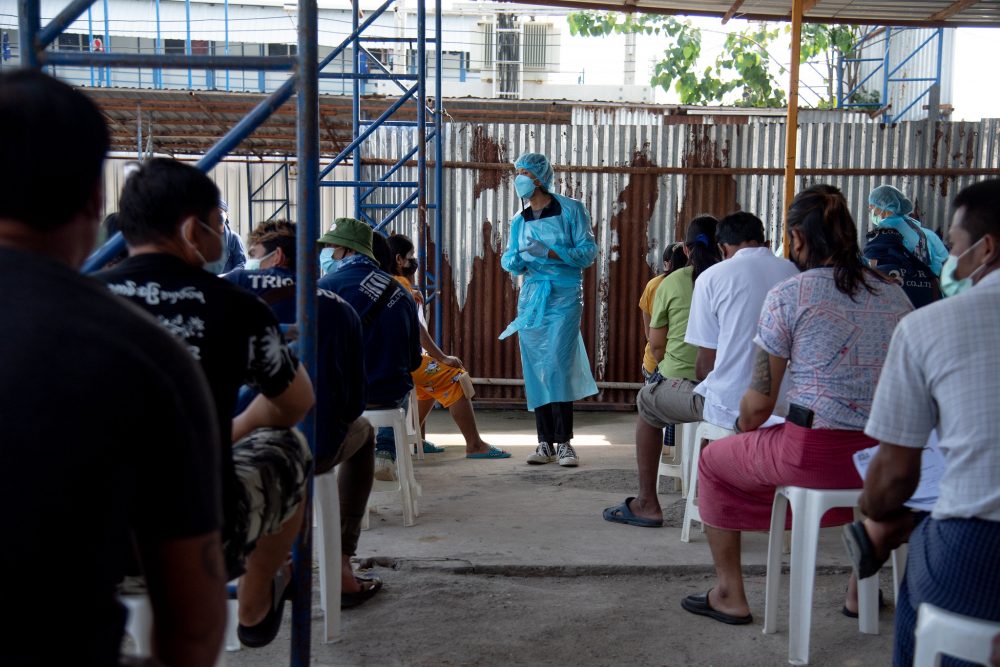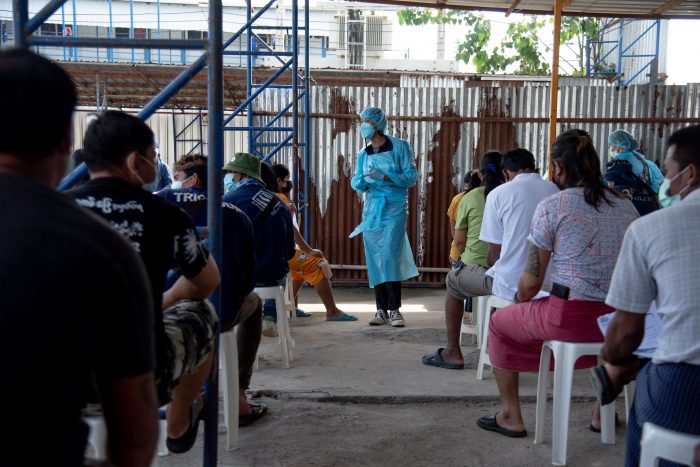
Ensuring access to healthcare for all
Excerpt some content and Credit to: https://www.bangkokpost.com/opinion/opinion/2707616/ensuring-access-to-healthcare-for-all. View our policies at http://goo.gl/9HgTd and http://goo.gl/ou6Ip. © Bangkok Post PCL. All rights reserved.

Kyan Thet Khaint, a migrant volunteer, gives COVID-19 information to migrant workers during a COVID-19 mass testing at a migrant labour campsite in Bang Sue, Bangkok – 31 October 2021 / © WHO/Ploy Phutpheng
The spread of Covid-19 in Thailand showed how no one is safe until everyone is safe. Indeed, it was reported that the outbreak which began in the country back in December 2020, originated in migrant worker communities in Samut Sakhon, which faced challenges in accessing healthcare services.
Public health authorities broadly recognized the situation and have since reinforced initiatives to improve access to healthcare for all migrants in Thailand, including, for example, by passing Resolution 14.2 at the National Health Assembly in December 2021, on the Protection of Equitable Access to Health Services for Specific Populations in Crises.
Over the past few decades, Thailand has made incredible progress in extending access to free healthcare for Thai citizens. Currently, all Thais have access to free healthcare under different health protection schemes according to the National Health Security Act of 2002. However, ensuring access to care for all migrant workers and their dependents has proved to be more challenging.
It is estimated that up to 4 million migrants work or live in Thailand. In 2022, 87% of the 2.5 million legally registered migrant workers were effectively covered by health insurance. While in principle all registered migrants should be enrolled under the Social Security Scheme of the Ministry of Labour, or the Migrant Health Insurance of the Ministry of Public Health, some migrant workforces were never enrolled or weren’t able to maintain coverage. In addition, it is estimated that 1 million migrant workers and their dependents in the country are unregistered, and they remain ineligible for inclusion under government insurance.
If they fall sick, migrants who are uninsured can still seek healthcare in government hospital or private clinics, but they need to pay all costs incurred. In some instances, government hospitals absorb the cost of care for uninsured migrants who can no longer pay, but as a result, many hospitals in areas that host large number of migrants are also often worried that they can be reported to immigration and deported when they seek healthcare in government facilities, and prefer to self-treat until they become severely ill. While they wait, their illnesses can spread.
It is estimated that migrant workers contribute between 4.3 and 6.6% to Thailand’s Gross Domestic Product, and the country ranks 17th in the world for the number of employed foreign workers. Several sectors of the economy depend heavily on employment of migrants, including the marine fishing industry, construction, agriculture and domestic work. Migrants typically occupy jobs that are difficult, dirty and dangerous. Yet employment of migrants is often subject of sensitive debates in society, owing in part to the particular challenges of ensuring that all migrants on Thai soil are legally registered. Migrants are often thought to be solely responsible for failing to register. However, the process involves their employers, can be time consuming, expensive, and require access to information on procedures that can be complex to grasp.
Many migrants are also employed on a day-to-day basis, in different locations, which is hardly compatible for registration by a unique employer and adding to their administrative burden when changing employers. Notwithstanding these complexities, unregistered migrants are often stigmatized, and when it comes to health benefits, a portion of the public opinion holds strong feelings that taxpayers’ money should not be used to provide free healthcare to migrant workers.
